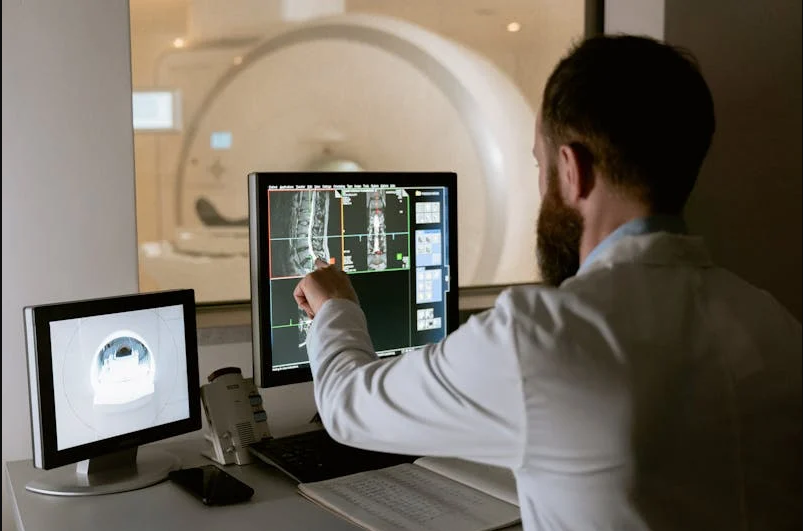The healthcare industry is at a crossroads. With an aging global population, escalating chronic disease rates, and the aftermath of a worldwide pandemic, the need for innovation has never been more pressing. Fortunately, advancements in technology are poised to revolutionize healthcare, making it more efficient, effective, and patient-centric.
This article will delve into five key innovations that are transforming the landscape of healthcare, from AI-driven diagnostics to blockchain for secure patient records. We’ll explore how these innovations are reshaping the industry and improving patient outcomes.
Artificial Intelligence and Machine Learning
Artificial Intelligence (AI) and Machine Learning (ML) are at the forefront of the healthcare revolution. These technologies are being integrated into various aspects of healthcare to enhance diagnostics, personalize treatment plans, and streamline administrative tasks.
AI in Diagnostics
AI algorithms can analyze medical images with remarkable accuracy, often surpassing human experts. For instance, Google’s DeepMind has developed an AI system capable of diagnosing over 50 eye diseases from retinal scans. Such advancements mean earlier and more accurate diagnoses, which are crucial for effective treatment.
Personalized Treatment Plans
Machine learning models can predict how patients will respond to different treatments based on their genetic makeup, lifestyle, and other factors. This allows for more personalized medicine, where treatments are tailored to individual patients, increasing their efficacy and reducing adverse effects.
Administrative Efficiency
AI can also streamline administrative processes, reducing the burden on healthcare professionals. Natural language processing (NLP) algorithms can transcribe and analyze doctor-patient conversations, automatically updating electronic health records (EHRs). This not only saves time but also reduces the risk of errors, which is particularly beneficial for organizations like Opportunity Healthcare Staffing, who rely on efficiency and accuracy in managing their workforce and patient data.
Telemedicine and Remote Monitoring
Telemedicine in primary care has seen explosive growth, particularly during the COVID-19 pandemic. It enables patients to consult with healthcare providers from the comfort of their homes, breaking down geographical barriers and increasing access to care.
Virtual Consultations
Virtual consultations have become commonplace, allowing patients to receive medical advice without physically visiting a clinic. This is particularly beneficial for individuals in remote or underserved areas. Companies like Teladoc and Amwell have seen significant increases in usage, demonstrating the growing acceptance of telemedicine.
Remote Patient Monitoring
Wearable devices and smart home technologies enable continuous monitoring of patients’ health. Devices such as the Apple Watch can track heart rate, ECG, and blood oxygen levels, alerting users and healthcare providers to potential health issues before they become serious. Remote monitoring is especially beneficial for managing chronic conditions like diabetes and hypertension, where continuous data can significantly improve outcomes.
Blockchain for Secure Patient Records
Blockchain technology, best known for its use in cryptocurrencies, is now making waves in healthcare by providing a secure, decentralized way to manage patient records. This innovation addresses critical issues such as data security, interoperability, and patient privacy.
Enhanced Security
Blockchain’s decentralized nature makes it inherently secure against hacks and unauthorized access. Each block of data is linked to the previous one, creating an immutable chain that is extremely difficult to alter. This ensures that patient records are secure and tamper-proof.
Interoperability
Interoperability has long been a challenge in healthcare, with different systems struggling to communicate effectively. Blockchain can provide a unified framework where all healthcare providers can access and share patient data seamlessly. This improves the continuity of care, as healthcare professionals have access to complete patient histories.
Patient Control and Privacy
Blockchain also empowers patients by giving them control over who can access their data. Through smart contracts, patients can grant and revoke access to their health information, ensuring their privacy is maintained.
Robotics and Automation
Robotics and automation are transforming various facets of healthcare, from surgery to inventory management. These technologies enhance precision, reduce human error, and increase efficiency.
Surgical Robots
Robotic surgery has been one of the most significant advancements in medical technology. Systems like the Da Vinci Surgical System enable surgeons to perform minimally invasive procedures with greater precision and control. Robotic surgery reduces recovery times, minimizes scarring, and decreases the risk of complications.
Healthcare Inventory Management Solutions
Efficient healthcare inventory management is critical to ensure that the right supplies are available when needed. Automated systems can track inventory levels in real time, predict shortages, and manage orders. This reduces waste, lowers costs, and ensures that healthcare providers are always equipped to deliver optimal care.
The future of healthcare is being shaped by groundbreaking innovations, including advancements in personalized medicine and genetic testing. As healthcare becomes more precise, technologies like DNA testing offer reliable solutions in various areas, including paternity verification. If you’re interested in learning more about it and how it can assist in resolving legal and personal matters, explore detailed resources available online.
Patient Care Robots
Robots are also being used to assist with patient care. For example, robotic exoskeletons can help patients with mobility issues regain movement, while service robots can assist with routine tasks such as delivering medication and food. This allows healthcare staff to focus on more complex care tasks and improves patient outcomes.
Genomics and Personalized Medicine
The field of genomics is revolutionizing our understanding of diseases and how they can be treated. Advances in genomic sequencing technology have made it possible to analyze a person’s entire genome quickly and affordably, leading to the rise of personalized medicine.
Genomic Sequencing
The cost of sequencing a human genome has dropped dramatically, from billions of dollars to less than $1,000. This has made it feasible for more patients to have their genomes sequenced, providing valuable insights into their risk for certain diseases and how they might respond to different treatments.
Targeted Therapies
Genomic information allows for the development of targeted therapies that are tailored to an individual’s genetic profile. For instance, in cancer treatment, drugs can be designed to target specific genetic mutations found in a tumor, increasing the chances of successful treatment. Companies like Illumina and 23andMe are at the forefront of making genomic data accessible and useful for personalized medicine.
Preventative Care
Genomics also plays a crucial role in preventative care. By understanding their genetic predispositions, individuals can take proactive measures to reduce their risk of developing certain conditions. For example, someone with a genetic predisposition to heart disease can make lifestyle changes and undergo regular screenings to catch potential issues early.
The Future is Bright
The innovations described above are just the tip of the iceberg. The convergence of technology and healthcare promises to bring about even more transformative changes in the coming years. As AI continues to evolve, we can expect even more sophisticated diagnostic tools and personalized treatment plans. The expansion of telemedicine and remote monitoring will make healthcare more accessible to all. Blockchain will enhance data security and interoperability, while robotics and automation will streamline operations and improve patient care. Genomics will usher in a new era of personalized medicine, where treatments are tailored to each individual’s unique genetic makeup.
Key benefits to look forward to:
- Improved diagnostic accuracy. AI-driven tools can detect diseases earlier and more accurately.
- Personalized care. Treatments tailored to individual patients increase effectiveness and reduce side effects.
- Increased accessibility. Telemedicine and remote monitoring break down barriers to care.
- Enhanced data security. Blockchain ensures patient records are secure and interoperable.
- Efficiency gains. Robotics and automation streamline operations and reduce human error.
- Proactive health management. Genomics allows for preventative measures based on genetic risk factors.
Wrapping Up
The future of healthcare is incredibly promising, driven by groundbreaking innovations that are transforming how care is delivered and experienced. From AI-driven diagnostics to blockchain for secure patient records, these advancements are making healthcare more efficient, personalized, and accessible. As these technologies continue to evolve, they will play an increasingly vital role in addressing the challenges facing the healthcare industry and improving patient outcomes. The journey has just begun, and the potential for positive impact is immense. Embracing these innovations today will pave the way for a healthier and more resilient tomorrow


